I’ve been reviewing credit cards for over 15 years — never mind using them myself! This is a curated list of what I think are some of the best credit cards available today if you pay your balance off every month and have good credit (see recommended credit cards for average credit or poor credit).
Unlike most websites recommending credit cards, this is not just a list of credit cards that pay me the most for promoting them. A few of my recommendations are affiliates and links to those cards’ application pages are denoted by a 💰 emoji. I do my very best to ensure the objectivity of my recommendations and present what I think are the best credit cards on the market — regardless of whether I earn anything from them. As always, if you do wish to apply for one of the affiliate cards, using my link helps support me and this site, and I am forever grateful 🙏🏻.
My favorite rewards credit cards
- For cash back:
- For travel rewards:
*Cards I’m personally using now. †Cards I’ve used in the past.
An important note if you carry a balance
Usually, the more generous a credit card’s rewards, the higher its interest rate. If you ever — even occasionally — use your credit card to pay for purchases over time, the only thing you should care about is finding the lowest APR possible. For that, I’ve found there’s no better place to find a credit card with a low regular APR than your local credit union. Unlike private banks that are focused on making profits for shareholders, credit unions are member-owned cooperatives that “reinvest” profits by offering members low borrowing rates. You can find credit unions near you using the National Credit Union Administration’s Credit Union Locator.
Fidelity Rewards Visa Signature
The Fidelity Rewards Visa Signature (review) is the credit card I use most because it pays 2% cash back on every purchase. There’s no annual fee, and every time you earn $50 or more the rewards are deposited directly into your linked Fidelity brokerage account. I like this because it makes it easy to invest my rewards rather that spend them. You can, of course, withdraw your earnings from Fidelity with no issue and spend them instead.
Fidelity® Rewards Visa Signature® Card
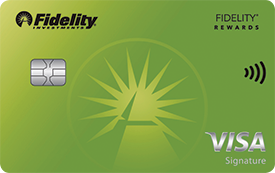
Information about the Fidelity® Rewards Visa Signature Card has been collected independently by Money Under 30. Please confirm terms on the card issuer's website. Offer details verified on May 8, 2024.
Welcome Offer
N/A
Rewards
Earn unlimited 2% cash back on all purchases to spend or invest with no rewards limits or spend caps.
Annual Fee
$0
Our Thoughts
This rewards card is best for those looking to get the most out of their purchases by investing rewards earned into an eligible Fidelity account.
As far as cash-back credit cards go, it’s difficult to beat earning 2% back on everything. Many cards allow you to earn higher rewards rates on some purchases (either in specific categories or on a limited amount of purchases). And some people like the game of trying to maximize their rewards across multiple credit cards. I do that to a limited extent by putting travel and restaurant purchases on one of my other cards, but I value simplicity. I’m not interested in keeping track of a half dozen credit cards.
Lastly, the Fidelity card is a Visa Signature card which means it comes with a host of benefits including no pre-set spending limit, a 24/7 concierge line, travel insurance, roadside assistance, and more.
Amex Blue Cash Preferred® Credit Card
The American Express Blue Cash Preferred® Credit Card (review) is a great choice if you want to earn cash back on everyday purchases like groceries and gas. There’s a $95 annual fee that is waived for your first year. You’ll earn:
- 6% cash back on eligible grocery purchases at U.S. supermarkets
- 6% cash back on select U.S. streaming purchases
- 3% cash back at U.S. gas stations, and on transit and ridesharing
- 1% cash back on everything else
Blue Cash Preferred® Card from American Express
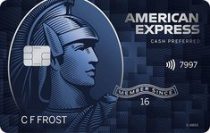
Information about the Blue Cash Preferred® Card from American Express has been collected independently by Money Under 30. Please confirm terms on the card issuer's website. Offer details verified on Mar. 22, 2024.
Welcome Offer
Earn $250 statement credit after you spend $3,000 on purchases on your new card in your first six months of card membership.
Rewards
Earn 6% Cash Back at U.S. supermarkets up to $6,000 per year; 6% Cash Back on select U.S. streaming subscriptions; 3% Cash Back at U.S. gas stations and on transit, and; 1% Cash Back point on all other purchases.
Annual Fee
$0 intro annual fee for the first year, then $95
Our Thoughts
An excellent credit card for families looking to earn top rewards for everyday spending.
Chase Freedom Unlimited® Credit Card
The Chase Freedom Unlimited® (review) is another good option for a no-annual fee cash rewards credit cards.
- Earn 5% cash back on travel purchased through Chase Travel℠, 3% cash back on dining and drugstore purchases, 1.5% cash back on everything else.
This card has a nice introductory offer. Earn a $200 bonus after you spend $500 on purchases in the first 3 months from account opening.
Chase Freedom Unlimited®
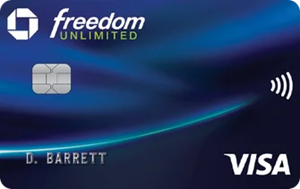
Information about the Chase Freedom Unlimited® has been collected independently by Money Under 30. Please confirm terms on the card issuer's website. Offer details verified on Aug. 17, 2024.
Welcome Offer
Earn a $200 bonus after you spend $500 on purchases in the first 3 months from account opening.
Rewards
Earn 5% cash back on travel purchased through Chase Travel℠; 3% cash back on drugstore purchases and dining at restaurants, including takeout and eligible delivery service; 1.5% cash back on all other purchases.
Annual Fee
$0 annual fee.
Our Thoughts
With no limit on cash back earned and no annual fee to worry about, this is an excellent option for people looking to earn on their everyday spending. The intro APR offer and first year welcome bonus are also attractive incentives. Pair it with a Chase travel card for better value on rewards or the ability to transfer to Chase travel partners.
Chase Sapphire Preferred® and Sapphire Reserve®
More so than any other credit card, I think Chase’s Sapphire products are responsible for creating such a competitive market for travel rewards credit cards. You can earn enough points to book a free trip just by signing up for one of these cards and fufilling spending requirements. You have two choices: The Chase Sapphire Preferred Card ($95 annual fee) and the Chase Sapphire Reserve Card ($550 annual fee.)
Sapphire Preferred
The Chase Sapphire Preferred® Card (review) has been a go-to card choice for casual travelers for over a decade. You’ll earn:
- 5x points on travel purchased through Chase Travel
- 3x points on dining, streaming, and online grocery purchases
- 2x points on all other travel purchases
- 1x points on everything else
Because you’ll earn Chase Ultimate Rewards points instead of miles, you have more options when you cash in rewards whether you choose to redeem them for a statement credit, transfer your points to a hotel or airline loyalty program at a 1:1 rate, or something else. And if you use your points to purchase travel through Chase Travel, they’re worth 25% more. For a mid-tier travel card, the annual fee is relatively low and easily made back with perks like a $50 annual hotel credit and complimentary DashPass access (activate by December 31, 2027).
Chase Sapphire Preferred® Card
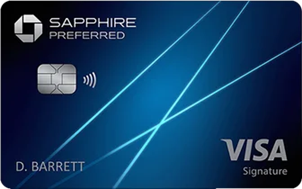
Information about the Chase Sapphire Preferred® Card has been collected independently by Money Under 30. Please confirm terms on the card issuer's website. Offer details verified on Aug. 17, 2024.
Welcome Offer
Earn 60,000 bonus points after you spend $4,000 on purchases in the first 3 months from account opening. That's $750 when you redeem through Chase Travel℠.
Rewards
Earn 5X on travel purchased through Chase Travel℠; 3X on dining, select streaming services and online groceries; 2X on all other travel purchases; 1X on all other purchases.
Annual Fee
$95 annual fee.
Our Thoughts
A premium travel rewards credit card with a reasonable annual fee that offers a generous sign-up bonus offer for new cardmembers. The valuable travel benefits, perks and protections make sense for just about any level of traveler, but those who utilize Chase Travel℠ or transfer points to Chase’s travel partners will be able to maximize value.
Sapphire Reserve
In addition to the previously-mentioned Fidelity Rewards Visa, the Chase Sapphire Reserve® (review) is one of my primary credit cards. But with a $550 annual fee, it’s obviously not for everyone. I’ve come a long way since I was a broke 20-something, and I’m now fortunate to have the means to take my family on epic vacations. We’ve been to Paris, Venice, Tuscany, Costa Rica and are heading to Japan next month. With all that spending on travel, the Sapphire Reserve card pays really pays off with the following benefits:
- Welcome bonus: Earn 60,000 bonus points after you spend $4,000 on purchases in the first 3 months from account opening. That's $900 toward travel when you redeem through Chase Travel℠.
- Rewards: 10x points on hotel and car rental bookings through Chase Travel℠; 5x points on Chase Travel℠ flight bookings; 3x points on travel worldwide; 3x points on other dining purchases (including eligible delivery services; 1x points on all other purchases
- Travel benefits: $300 annual travel credit; Priority Pass Select membership; up to $100 Global Entry, TSA Precheck or NEXUS fee credit every four years; Luxury Hotel & Resort Collection perks
- Travel Insurance: Trip cancellation and interruption insurance (up to $20,000 per trip); trip delay reimbursement (up to $500 per ticket); primary rental car coverage (up to $75,000); lost luggage reimbursement (up to $3,000 per passenger); emergency evacuation and transportation coverage (up to $100,000)
I take advantage of most of these perks. I get a statement credit for the first $300 in travel expenses I charge to the card each year. The card pays for TSA Precheck for me and my wife. And the included travel insurance is as good or better than what you can buy privately (for a lot more money). I recently declined a travel insurance quote of $800 for my family’s Japan trip that offered little more than I already have with the Reserve Card. Lastly, one really popular perk of this card is the Priority Pass membership which entitles members to use airport lounges around the world. I haven’t taken advantage of this yet only because I’m fiercely loyal to Delta Airlines and have a SkyClub membership, so I use Delta’s lounges exclusively. Just be careful: Once you experience airport lounges it’s hard to go back!
Chase Sapphire Reserve®
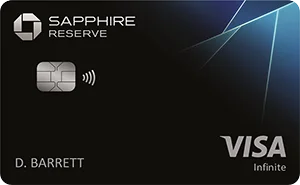
Information about the Chase Sapphire Reserve® has been collected independently by Money Under 30. Please confirm terms on the card issuer's website. Offer details verified on Aug. 17, 2024.
Welcome Offer
Earn 60,000 bonus points after you spend $4,000 on purchases in the first 3 months from account opening. That's $900 toward travel when you redeem through Chase Travel℠.
Rewards
Earn 10x total points on hotels and car rentals when you purchase travel through Chase Travel℠; 5x total points on flights through Chase Travel℠; 3X points on other travel and dining; 1 point per $1 spent on all other purchases. Rewards on travel after the $300 is spent on travel purchases annually.
Annual Fee
$550 annual fee.
Our Thoughts
Flexible rewards and premium travel perks, like airport lounge access and powerful travel protections, make this a top option for travelers who will maximize the benefits. Occasional travelers may want to consider a less premium alternative given the high annual fee.
Capital One Venture Cards
Capital One offers three versions of travel cards with different tiers of annual fees and benefits: VentureOne, Venture and Venture X. I like the Venture cards because their straightforward rewards are easy to earn and redeem. They are also some of the best credit cards for international travel because they don’t charge foreign transaction fees.
VentureOne
The CapitalOne VentureOne Card (review) has no annual fee and pays 1.25x miles per $1 spent. Miles can be redeemed 1:1 for travel booked through Capital One Travel. It’s been the most popular travel rewards card among Money Under 30 readers for years, but I think that’s mostly because there’s no annual fee.
Capital One VentureOne Rewards Credit Card
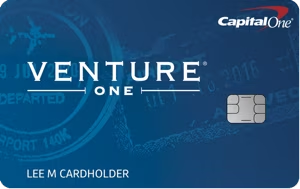
Information about the Capital One VentureOne Rewards Credit Card has been collected independently by Money Under 30. Please confirm terms on the card issuer's website. Offer details verified on Apr. 29, 2024.
Welcome Offer
Earn 20,000 bonus miles once you spend $500 on purchases within the first 3 months from account opening.
Rewards
Earn an unlimited 1.25 Miles per dollar on every purchase; 5 Miles per dollar on hotels and rental cars booked through Capital One Travel.
Annual Fee
$0 annual fee.
Our Thoughts
A travel card for beginners that earns flexible rewards but at a low rate compared to similar no-annual-fee credit cards. Cardholders who spend would likely be better off paying the annual fee for the better benefits and sign-up bonus that comes with the Capital One Venture instead.
Venture
The Capital One Venture Rewards Credit Card (review) charges a $95 annual fee but pays 5x miles on hotels and rental cars booked through Capital One and 2x per dollar spent elsewhere. If you plan to spend more than $12,500 per year on this credit card, you’ll net more free travel with the Venture Card than the VentureOne card after factoring in this card’s annual fee. Venture users will also enjoy up to a $100 credit toward Global Entry or TSA PreCheck® membership. Benefits like this are typically reserved for cards with annual fees 4-5 times higher.
Capital One Venture Rewards Credit Card
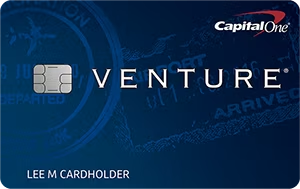
Information about the Capital One Venture Rewards Credit Card has been collected independently by Money Under 30. Please confirm terms on the card issuer's website. Offer details verified on Apr. 29, 2024.
Welcome Offer
Earn 75,000 bonus miles once you spend $4,000 on purchases within the first 3 months from account opening.
Rewards
Earn unlimited 2 Miles per dollar on every purchase; 5 Miles per dollar on hotels and rental cars booked through Capital One Travel
Annual Fee
$95 annual fee.
Our Thoughts
This is an easy-to-understand popular option that's rightfully among the best travel rewards credit cards. The simple rewards on every purchase, high sign-up bonus for new cardholders, flexible redemption options and cardmember benefits are hard to beat.
VentureX
The Capital One Venture X Rewards Credit Card (review) is one of the best credit cards for people who are willing to pay for excellent travel benefits and convenience. It comes with a hefty price tag of $395 per year, but those who spend more than $5,000 on travel annually should have no problem earning this annual fee back and much more. The $300 annual travel credit and $100 Global Entry or TSA PreCheck® credits alone might make it worth it for frequent flyers.
Capital One Venture X Rewards Credit Card
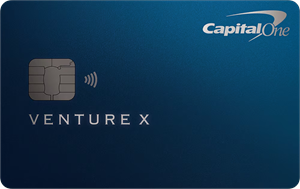
Information about the Capital One Venture X Rewards Credit Card has been collected independently by Money Under 30. Please confirm terms on the card issuer's website. Offer details verified on Apr. 28, 2024.
Welcome Offer
Earn 75,000 bonus miles once you spend $4,000 on purchases within the first 3 months from account opening.
Rewards
Earn 10 Miles per dollar on hotels and rental cars booked through Capital One Travel; 5 Miles per dollar on flights booked through Capital One Travel; unlimited 2 Miles per dollar on all other purchases.
Annual Fee
$395 annual fee.
Our Thoughts
A premium travel credit card option that's a step up from the Venture Rewards. For those fine with Capital One Travel, the airport lounge access, annual credit, anniversary bonus miles and travel-friendly perks can make this card worth the high annual fee. Just be sure to maximize all it has to offer.
My advice on choosing a new credit card
My take on credit cards is that they are a necessary evil. I know, as well as anyone, the debt and suffering misusing credit cards can cause. I also recognize that credit cards can cause us to spend more both because they make spending so friction-less and because rewards features encourage spending.
The fees credit cards charge merchants (which are higher than debit card fees) are what enable the credit card issuers to offer rewards. But merchants bear that cost and simply pass it back to us, the consumers, in the form of higher prices. Put another way, everybody who busy anything (even with cash) shares in the cost of funding credit card rewards. But only those who regularly pay with rewards cards reap the benefits. Sadly, it’s another way The Haves get richer off the backs of The Have Nots. If you don’t have the income, credit, or good financial habits to pay with a rewards credit card, you’re paying the same prices as those with rewards credit cards. It’s like paying a 2% tax on everything you buy.
It comes down to a case of “if you can’t beat them, join them.” As long as you have the wherewithal to always pay your credit card charges in full so you never pay interest, you should use a rewards card to avoid paying a 2% tax on your purchases. After that, it’s up to you how seriously you want to play the game.
There’s something to be said for the simplicity of choosing a cash-back card and using it for everything. At the other extreme, a creditworthy consumer can apply for several credit cards every year. There are few limits to how many cards you can have, although certain issuers will limit how many of their cards you can open in a certain period of time. For example, Chase limits you to opening 5 cards every 24 months. That’s still a lot of credit cards!
If you’re a big spender — or, perhaps, can charge business expenses — taking advantage of lucrative credit card sign-up bonuses can net you thousands of dollars. And while earning 2% back on $3,000 worth of purchases each month will net you $720 in annual rewards, that amount could be double or triple if you voraciously optimize which credit card you use for which expense. The more you spend, the more optimizing for one or two percentage points pays off.
At the end of the day, my advice comes down to this:
- Avoid credit cards altogether if you struggle with spending within your means and frequently run up balances you can’t pay off at the end of the month.
- Otherwise, use a credit card for most purchases. It’s safer than using a debit card, and not claiming your share of rewards is leaving money on the table (paying the 2% tax).
- Start with a basic cash-back card.
- If you’re inclined, add one or two more rewards cards that pay extra on purchases you make frequently.
- Limit new credit card applications to no more than one or two every 6 months. If you’re declined for one card, applying for others may further hurt your credit temporarily. And AVOID applying for a new credit card between 6 months and a year before applying for an important loan like a mortgage.


